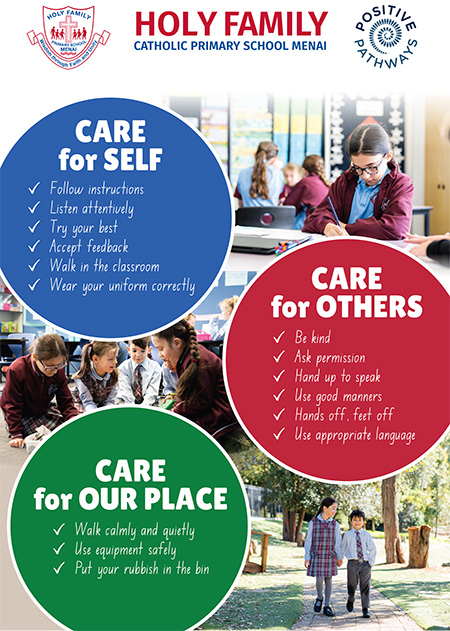Positive wellbeing is fundamental to a child’s ability to learn, develop and thrive at school.
We know that when students feel supported, they are more engaged with their learning.
At Sydney Catholic Schools, we commit to providing safe, supportive and inclusive environments which nurture the wellbeing of all students and staff in our community.
Our student wellbeing policy is underpinned by the Australian Student Wellbeing Framework. The framework recognises five elements that are key to supporting the whole school community to build and maintain safe, positive relationships and wellbeing: leadership, inclusion, student voice, partnerships and support.
This is complemented by the Be You Framework, a national initiative for educators aimed at promoting and protecting positive mental health in children and young people. The integration of both frameworks supports our school communities to provide every student with the strongest foundation possible for them to reach their aspirations in learning and in life.
We have a systemic approach to wellbeing and positive behaviour with tiers of support to meet the diverse needs of staff, students and families. The offerings range from whole school initiatives, actively seeking student voice, system policies on anti-bullying, student counselling, staff training in student wellbeing, along with targeted interventions for students with complex social and emotional needs.

Positive Pathways
Positive Pathways is a behaviour-management system that is underpinned by the School-Wide Positive Behaviours for Learning framework (SPBL). The aim is to increase the learning outcomes of students by creating and maintaining a positive learning culture through the use of proactive teaching practices and measures.
All key stakeholders in the Holy Family Catholic Primary School community are committed to:
– developing strong relationships between students, staff and parents.
– explicitly providing social skill instruction at the time of need.
– setting, and consistently managing, clear expectations across the school to create predictable outcomes when managing student behaviour.
Social Skills
Social skills are taught consistently across the school through the use of scripts. Staff are trained to explicitly teach students skills specific to their areas of need via role plays and, when required, social stories. All behaviour is viewed as communication and negative behaviours are viewed through the lens of a social skill deficit which can be developed through regular and purposeful practise.
Rewards
Student behaviours are positively reinforced through the collection of points, also called Caring Coins. These points are earned by students when they are following the school expectations. Each student has the opportunity to redeem their points weekly for individual or class rewards. Students earn a Citizenship Award for every 250 points earned. Special morning or afternoon teas are also held to celebrate reward recipients when they reach certain milestones.
250 Points = Level 1 Citizenship Award
500 Points = Level 2 Citizenship Award
750 Points = Level 3 Citizenship Award and school medallion
Consequences
When a student requires practise with or the correction of a behaviour in the classroom or playground, a teacher supports this with a visual reminder called a yellow card. This supportive tool is used so students can record the skill they are correcting and can see the behaviour has been corrected by being stamped off. If a student is unable to correct their behaviour after three yellow cards are earned in one incident then a student earns an office referral. Students can also earn office referrals for immediate interventions if deemed necessary. During the referral process the student intensely practises the social skill which is in deficit and a restorative conversation occurs where relationships are healed and the student and/or adult move on. Any missed learning time is then made-up and parents are notified.
Further consequences occur as deemed necessary by the school leadership team.
